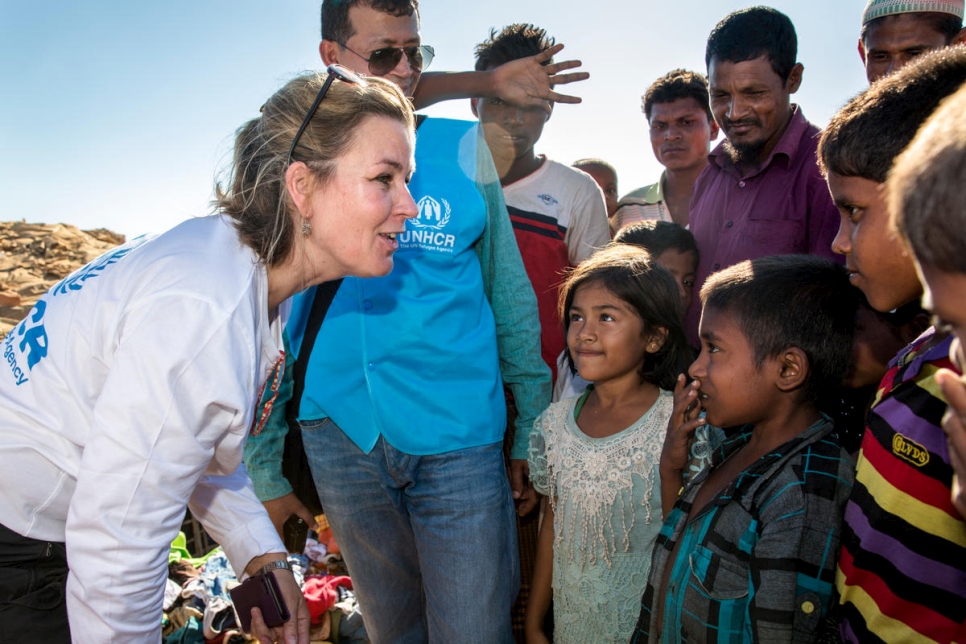'I want a world that is not broken up, at war'
Deputy High Commissioner Kelly T. Clements, UNHCR's most senior woman, gives a compelling account of what keeps her up at night.
Deputy High Commissioner for Refugees, Kelly T. Clements, in the Nayapara refugee camp in Bangladesh.
© UNHCR/Andrew McConnell
Name: Kelly T. Clements, from United States of America
Job title: UN Deputy High Commissioner for Refugees
You went to Bangladesh in 1992 to work with Rohingya refugees, very early in your career. Can you tell me about that?
My experience (in 1992 with UNHCR) in Cox’s Bazar is the reason that I'm sitting and talking with you today. People had come across from Myanmar in considerable numbers. It was very crowded, quite chaotic. We had near riots at some points in terms of food distribution. We had to change the system to ensure that the most vulnerable were in fact getting fed. I remember people standing for hours in the sun, with black umbrellas. It was overwhelming at times.
Is there one conversation you had back then that you can’t get out of your head?
There was one family, a woman with three or four very young children. In the melee, she had lost her food ration card. And she had not been able to feed her kids for over two weeks. She was in tears when we talked. It took a long time but we were able to get her another card. Going back on a repeat visit, she heard I was in the camp and she came and found me. I remember her face quite vividly. She had tears and she said, “These are tears of joy.” And she said, “I'm not sure what I would have done without UNHCR.”

UNHCR Deputy High Commissioner Kelly T. Clements meets Rohingya refugees during a visit to Kutupalong camp in south-east Bangladesh. © UNHCR/Andrew McConnell
You have recently been back to Bangladesh, and saw the work of UNHCR helping the Rohingya today. How did it feel to return to a situation that is so similar?
It was quite emotional for me to go back. So many people have come, not just in this emergency, but in the last 25 years. It was emotional to see colleagues still dedicated to protect them and to provide relief.
Kutupalong - over 500k new Rohingya arrivals in this refugee camp alone from #Myanmar - drastic change from 19k registered 4 years ago when I was last in #Bangladesh pic.twitter.com/Lxh1wVovit
— Kelly T. Clements (@KellyTClements) December 4, 2017
Before this emergency began, I think there was a real hope that UNHCR could work itself out of a job in Bangladesh, but this of course changed everything. How do we equip people to be able to help themselves?
Do you ever feel despair?
It's easy to feel despair and to be quite frustrated, particularly in the last couple of years when things have become so difficult and borders are closing and policies are becoming more restrictive and people are treated as inanimate objects as opposed to human beings. That makes me angry. But then there's resolve to really make a difference. I'm a rather optimistic person. I try to live to see the silver lining.
We will see solutions. We will see the possibility of people returning or rebuilding their lives. I was in Guinea in 2003 when Liberians were returning and I met this young mother and her newborn baby, who were about to return. The joy on their faces was just remarkable and it really stayed with me.

Deputy High Commissioner for Refugees Kelly T. Clements plants a mango tree to mark her visit to Nakivale settlement, Southwest Uganda. © UNHCR/Frederic Noy
What concerns you about your work?
We are incredibly stretched as an organization. When we can't get the funding, the relief supplies and the people to an emergency situation fast enough, that keeps me up.
What do you hope for?
I want a future for our children. And I want a world that is not broken up, at war, with people unwilling to talk to each other and not treating others humanely. It’s about how we prepare our kids to contribute to that peaceful world we need.
